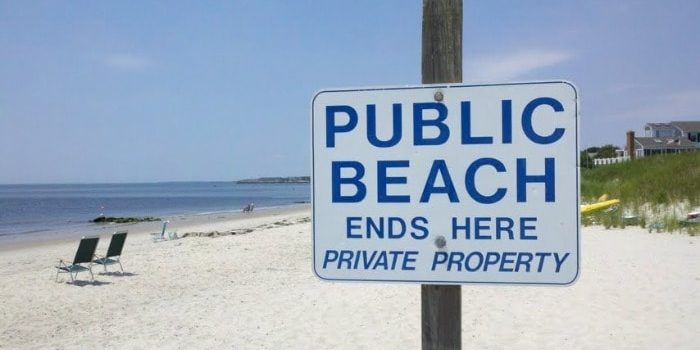
The far edge of privatization: Monopolizing the beach
MIAMI – The trend toward privatization in the United States has been underway for decades, driven by the race to maximize corporate profits and a Republican ideology that systematically favors private over public interests.
The latest twist in this long and ever-more pervasive process is the effort to privatize access to a cherished, defining feature of most coastal communities: the right to ocean beaches. Florida is one of the places where that right is under challenge.
Turning the ocean’s edge from a public good to exclusive private use is not the most significant or damaging aspect of privatization. But it is a highly symbolic one. The ocean, like the air, is a public good par excellence. If you can appropriate that you can privatize anything. The phrase “the sky is the limit” is not a cliché in this case. And, unlike other privatization drives it affects everyone, and not just the workers in a given industry or employees for a particular enterprise.
In principle, you can’t privatize the beach. The absurdity of the idea of privatizing the beach boggles the mind. Plus, the Constitution of several states as well as state and local laws protect public access to the beach.
The reality on the ground often has differed from the principle. The tideline defines the boundary between the public and the private. But how do you get to the tideline? Many of the hotels and homeowners with beach property here and in other coastal areas already do everything they can to block beachgoers. Yes, as Miami Beach City Manager Jimmy Morales said, the beaches of Miami Beach are owned by the state. So it is by and large open and free.
But try to reach an open and free beach in the Village of Key Biscayne and you are not likely to find it. That’s not by accident. As a legal fig leaf, there is a single narrow corridor that connects the urban area and the beach. Find it. You have to be a real, real local to know where it is. There are no signs directing the way. No public parking. They really don’t want you to go there.
The situation is worse in some other coastal areas. A few years ago, I was invited by a progressive foundation to join them for a retreat on South Padre Island, Texas. We stayed in a nice hotel right on the beach. When the work was over, I walked on the beach and saw nothing but a few white tourists. I walked for a long time before I reached a sliver of beach. That was the public beach and was crowded with Raza and other locals. It didn’t feel good to see a line so clearly drawn on the sand or being on the privileged side.
The point of this excursus is to say that there was a lot of exclusion even before the Republicans got to work deploying their top-down class war to the question of beach access. They have had bigger fish to fry but now that they have played the exclusion game on everything from health care to taxes, they are onto ensuring the rich and corporate hotels have a freer hand in keeping the teeming masses away from their private sand.
In March, the Florida state legislature passed a law, HB 63, which bans local governments from approving ordinances that makes it illegal to block access to the beach through private property. In its story, the The Tampa Bay Times, which published the original story that later was reprinted in Miami Herald, reported the facts. But the headline of the story seems intended to suggest that, hey, it’s not as bad as it sounds. The actual reporting belies that:
“The bill, HB 631, blocks local governments from adopting ordinances to allow continued public entry to privately owned beaches even when property owners may want to block off their land. Instead, any city or county that wants to do that has to get a judge’s approval first — by suing the private landowners.
“The new law ‘is very bad for local governments,’ said Alison Fluornoy, a University of Florida law professor. ‘Suing coastal landowners as the only avenue to establish access is not an attractive option.’ She also pointed out that requiring a lawsuit means the Legislature put an added burden on the courts without offering any additional funding.”
Far from being inconsequential, HB 631 drastically shifts the balance of power on access to the beach in favor of the landowner and against the beachgoer. What citizen or small town wants to sue the Hilton?
The reporting is good. So how and why did the headline writer get from that to this headline?
“Does new law restrict public access to Florida’s beaches? Not exactly”
Yes, it does. Exactly.
HB 631 is not only bad for Floridians. It sets a bad precedent for the nation. Right now, in California, venture capitalist Vinod Khosta, worth $3 billion, is using his deep pockets to fight provisions in the State Constitution and in state law that mandate free access to the beach. Khosta vows to litigate the case to the end, and he has the money to do it. Fortunately, he has a tough row to hoe. Beach access is virtually sacred to Californians. And, unlike in Florida, in California political leaders don’t act as if their main job is to carry water for moneyed interests.
Capitalism in its savage American form has already privatized virtually everything. Now it is coming for the beach. This would be a good time and place to draw a line in the sand and reverse the tide.


